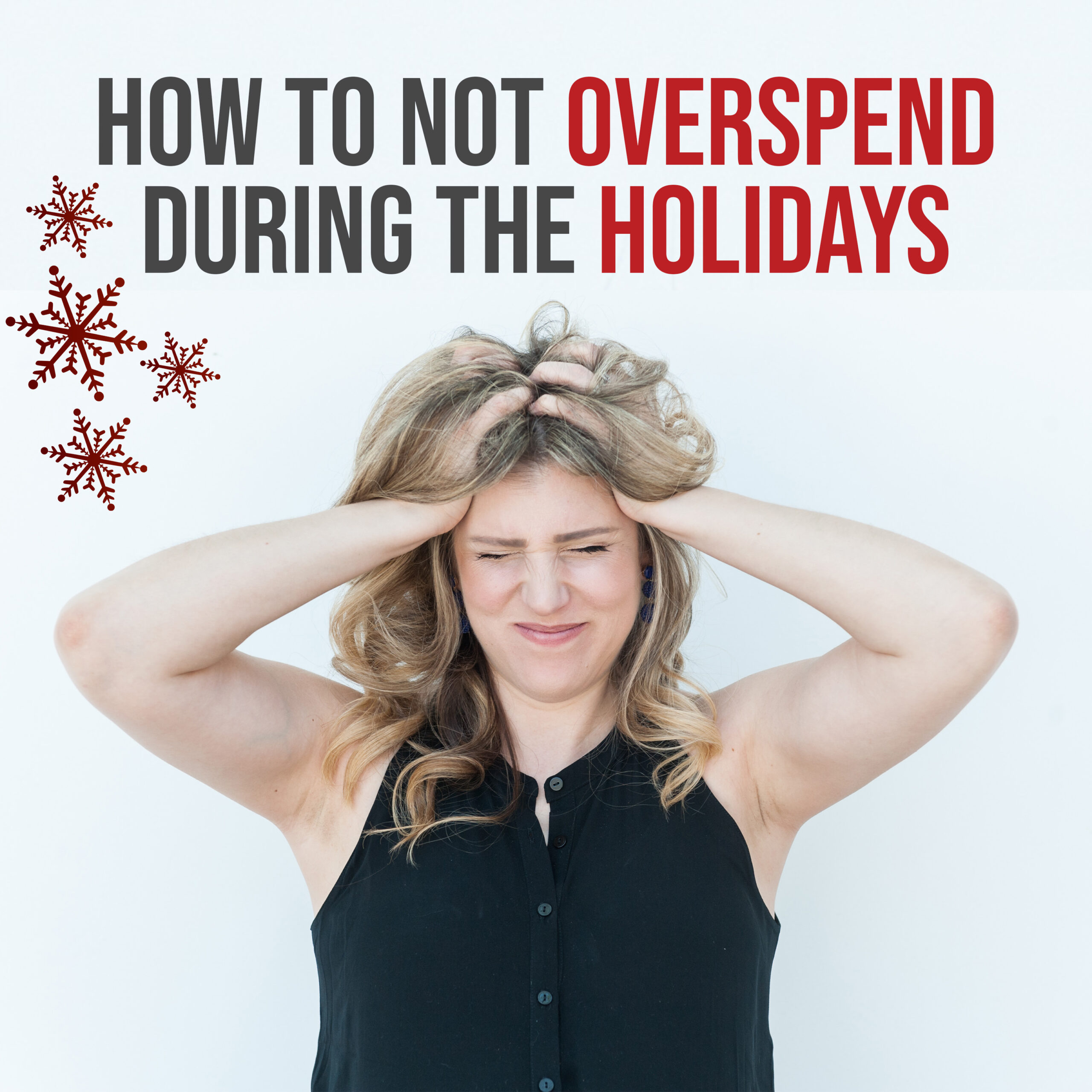Blog
Ohhhh, the holidays…. and holiday shopping!!! How I love thee… well, kind of. Ever go to the store, start hunting for gifts, then somehow end up with 3 new sweaters, an Instapot, maybe some new shoes, and STILL no gifts for anyone else? No??? That’s just me? But I neeeeeed that Instapot. It’s amazing.
All kidding aside, holiday spending can easily turn into holiday OVERSPENDING, and it adds way too much pressure to an already expensive season. It’s bad for your financial health, and at the end of the day, is it really bringing you and your loved ones joy?
There are some really simple strategies to keep in mind to help you make it through the minefield of December spending, and honestly, these are tools you can use anytime. Birthdays, Valentine’s Day, Arbor Day… you get the drift.
1. Set a Budget
Include any expenses that are outside of your normal expenditures, and related to the holidays. Going to visit family? Include travel. Have a list of people to buy gifts for? Include dollar amounts for each person. Making a special holiday meal? Set your budget and plan your menu accordingly. Having an overall holiday budget before you start spending will help reign in those holiday dollars.
2. Use Cash
Cash is king when it comes to sticking to your holiday budget. It’s WAY too easy to be out shopping and be tempted by all the beautiful store displays, tons of options and impulse buys. If you only allow yourself to spend the cash that you have on you (the cash you decided on in your holiday budget), then you can’t go over it! So before you hit the store, hit the ATM and leave those credit cards at home.
3. Consolidate Gifting
One of the hardest parts of holiday gifting is feeling pressure to give a gift to every single person who gives you one. Or having a large group of friends and/or co-workers who exchange gifts. But, why? Do we really need to get and give presents to every single person in our circle? (The answer is a big fat NO). Get together with the people you spend time with, and do a white elephant exchange, or secret Santa, or whatever kind of ‘I drew your name out of a hat’ game feels fun for your Christmas/Kwanza/Hannukah/Festivus celebration! We’re nothing if not inclusive 😉
4. Get Crafty
You don’t have to spend a lot of money to give a really memorable gift! Be creative, be thoughtful, be crafty, and really dig into the spirit of the season. One of my FAVORITE gifts from my husband was a scavenger hunt of small silly presents. We had agreed to not spend money on each other that Christmas and the care and effort he put into that “gift” was so incredibly special to me. To this day, it’s one of my favorite memories of us.
5. Set Deal Alerts
Have something that you really REALLY want to buy, but it’s just a little too expensive? Set up a google alert to look out for a sale! Or have a favorite store that you like to shop at? Same thing- keep an eye out for holiday specials, search for coupons and discount codes online. There are soooo many deals to be had if you look. Because who doesn’t love a good bargain, right??
I know that December can strike dread into the hearts and bank accounts of many, but if you try some of these ideas, you might find that it’s really not so bad after all. And who knows, it might make your holiday just a tiny bit merrier and brighter.
Cheers!
Lizy
November 25, 2019

Stand out entrepreneur and multimillionaire Rob Drydrek was able to provide some truly amazing perspective on how to manage your finances. The man has done his homework financially, and it shows!
I was fortunate enough to have an intimate conversation with him — and there 5 major takeaways that I’ve got to share!
(spoiler: I’m giving you a little homework to really take these best practices to heart)
In today’s video we’re talking about:
1. Leveraging financial opportunities for results greater than just short term gains
2. Better places for your money than just sitting in the bank
3. Why it’s so important to educate yourself financially
4. Diversifying your investments ——> for a deeper dive, you can check out my previous video on the 7 streams of income millionaires use to create wealth, here!
5. How to live your life with purpose and passion, and apply that mentality to your finances!
And finally, for your homework: after you’ve finished watching the video, check out the PDF below to create your own “Wouldn’t it be cool…” list
November 18, 2019

Sometimes the things we hear about credit scores end up being like when a story gets exaggerated from person to person. You know, like that time you saw a spider the size of a quarter in your shower, but when you told your friend about it — it was the size of your hand…
A lot of it is misinformation, to begin with, but when presented alongside fear-based sales tactics… the truth becomes pretty skewed.
Today I’m confronting some of the urban legends you may have heard about credit and presenting the truth, the whole truth — and nothing but the truth.
Let’s begin the debunking process by laying all the cards out on the table…
Key terms we need to know:
Credit score – The numerical expression of your creditworthiness that banks use to loan out credit. Banks and credit companies have developed algorithms that use this number to determine how likely you are to repay on a line of credit.
FICO – aka Fair Isaac Corporation. I hear you, “Okay great, who’s Fair Isaac?”
Quick history lesson! (trust me, this is important!) Back in the 1960s, Fair Isaac literally pioneered a revolution by creating credit risk scoring for the financial services industry. His new system allowed businesses to properly analyzing risk on loans, and also expanded consumer’s access to credit. Quite literally, a game-changer. Pretty cool how to see how far “being ahead of the curve” catapulted the Fair Isaac Corporation, as Fair Isaac’s FICO score is widely recognized as the industry standard for lenders!
“Free Credit Report” – This type of report that you can pull from home is provided by a company called Vantage. Their business model tried to compete with FICO by providing transparency to consumers, allowing them to see their credit scores and what was affecting them in (relatively) real-time. However, FICO and Vantage are two separate companies… with two separate algorithms for determining your “credit score”. This is why often times your credit report that you pull does not match your FICO score when applying for a loan!
Hard Credit Pull – A request for credit the releases your official credit score
Soft Credit Pull – This report basically just shows what’s there on your credit report. (ie: payment history, current lines of credit, outstanding balances, etc.)
Alright, now that we are experts in credit terminology let’s get to the good stuff: the truth!
So what makes up your credit score anyways?
30-35% CREDIT HISTORY
This typically has the biggest effect on your overall credit score. How long have you been making on-time payments? The better your payment history the better your score. Makes sense.
30% YOUR AVAILABLE CREDIT
This is how much you owe based on how much is available to borrow. What lenders are looking for is no more than 30% of your available balance to be borrowed at any given time.
15% LENGTH OF TIME
How long have you had a history with lines of credit? Months? Years? A longer exposure to credit (with on-time payments) will help boost your score.
10-15% DIVERSIFICATION
What types of credit loans make up your credit history? (ie: Installment loans, long-term loans, short-term loans, credit card debt, etc.) Many credit users benefit from having a diversified credit profile.
Less than 10% NEW CREDIT AND INQUIRIES
This is the item I swear that gets the most media attention, and it actually has the lowest impact on your overall score. Since a new line of credit doesn’t showcase your good behavior to a potential lender, it’s kind of just a big question mark. Why was this line of credit opened? Will you continue making the payments on time? Since there is some question here, it does mean more risk for the lender — which is why it affects your score negatively.
As far as inquiries go, you will often you’ll hear loan providers, well-meaning friends, or family tell you that if you shop your home loan, your credit score will drop! While this is true, some salespeople will use this more as a scare tactic to prevent you from doing your research. Multiple inquiries (3-5 credit pulls) for the same installment debt will count as one inquiry and will not have an impact on the score, so long as the “shopping” is done within 45 days. Inquiries will show on a credit report for a maximum of two years, and only impact your credit for 1 year. Typically, it will only drop your score if you have 6+ different credit pulls for various types of credit lines as some statistics correlate this many credit applications with a greater risk for bankruptcy.
My advice? When you’re pursuing a home loan, work with a reputable lender who can help you maximize your buying potential. Start shopping for a rate within 30 days of your home purchase, as this should keep everything under the “45-day” umbrella!
I hope you learned something you didn’t already know about your credit! Why? Because it’s YOUR credit! And my goal is to empower you by giving you the knowledge to make smart financial decisions. Are there any other urban legends that you may have heard about credit that you’d like me to address? Let me know in the comments below!
October 28, 2019

What You Don’t Know About Mortgage Insurance (and How it Affects Your Monthly Budget!)
When you think of a mortgage, you think of the money you pay each month towards your home loan, right? Yes, this is totally true, BUT a mortgage payment includes more than just paying towards the amount of money that was initially borrowed. Mortgages consisted of what we call PITI — Principle, Interest, Taxes, and Homeowners Insurance. It can also include an additional payment for mortgage insurance (aka PMI) if you are borrowing more than 80% of the value of your home/purchase price.
PMI is an insurance policy that is collected that helps the Bank recoup some of their financial investment in the event their borrower stops making their mortgage payments and the house goes into foreclosure. It has become way more prevalent since the “Great Recession”. According to the latest study done by the Urban Institute approximately 48.8% percent of agency (Fannie Mae, Freddie Mac, FHA, or VA)mortgages done in 2016 had mortgage insurance.
So while the principal amount loaned and the potential interest rate on that loan are often in the forefront of homebuyers minds, I’m here to tell you that your mortgage insurance can actually make a bigger impact on your monthly payment than your interest rate.
Typical scenario: home buyer reaches out to a call center asking for a quote on a 30 year fixed rate mortgage at the lowest interest rate possible. Call center presents the lowest rate possible with buying points. Call center does not take the most important piece of the puzzle into consideration: your unique financial situation.
**To keep us all on the same page, “buying points” are what lenders will offer you, the borrower, to bring down your monthly payment by decreasing the interest rate on your loan. Anyone can buy them, but you’ll pay the lender a one-time fee as part of your closing costs. Think of it as “buying down your interest.”
It’s extremely rare that you will get a home loan analysis that compares a variety of different mortgage products. But quite honestly, if you don’t — red flag! Do not pass go do not collect 200 dollars.
Presenting options based on different mortgage insurance factors is an important step in applying for a loan. Let’s break it down and take a closer look…
The biggest three things that affect potential mortgage insurance options are your,
Credit Score
Debt to income ratio
Loan to value ratio
And there are four ways to proceed after mortgage insurance comparisons,
Monthly Payments – determined by the lender based on the above
Upfront Purchase – the option to buy out the price of mortgage insurance upfront, rather than in a monthly payment
Hybrid – Pay a certain percentage to bring down the monthly payment
Government programs – Subsidized Mortgage Insurance (interest rates are higher, but the mortgage insurance is a lot less)
Let’s take a look at the difference in a few mortgage insurance rates based on credit score,
***Please note these are just examples and NOT QUOTES for mortgage insurance***
Example A – $200,000 loan with 680 credit score
A monthly premium for mortgage insurance would be around $200/month
To buy it out completely is 3.68% would be about $7360
Pursuing a hybrid approach would be about $2000 and this bring payments down to $168/month
Example B – $200,000 loan with a 740 credit score
A monthly premium for mortgage insurance would be about $116/months
To buy it out completely would be about $4300 which is 2.19%
If you were to take a hybrid approach and buy it out at a half a percent, that would take the payment down to $103/month.
Example C – FHA Loan of $200,000 with a 680 Credit Score
If you do the minimum down program, the mortgage insurance payment stays with the loan for the life of the loan. No exceptions.
An upfront premium is included that is financed into the home loan, so you do lose a little bit of equity
Interest rates are a quarter to a half percent lower than a conventional loan (this is maybe a $60 savings)
Mortgage premium would be $141/month for the lifetime of the loan.
Make sense? Sometimes it might feel like 1,472 new terms are being thrown at you as you’re preparing to buy a home, but if you keep educated yourself one thing at a time, I promise you will have so much more peace of mind when you purchase your home. (not to mention some possible extra dollars in your monthly budget, too!)
The home buying experience is not a one size fits all gig! You need options that take your lifestyle, preferences, and financial history into account before you make a big decision like taking on a home loan. My team is committed to presenting at least three of four options to you to help you make the very best decision possible!
What questions do you have in regards to mortgage insurance? I want to hear it all! Please let me know in the comments below!
October 21, 2019



